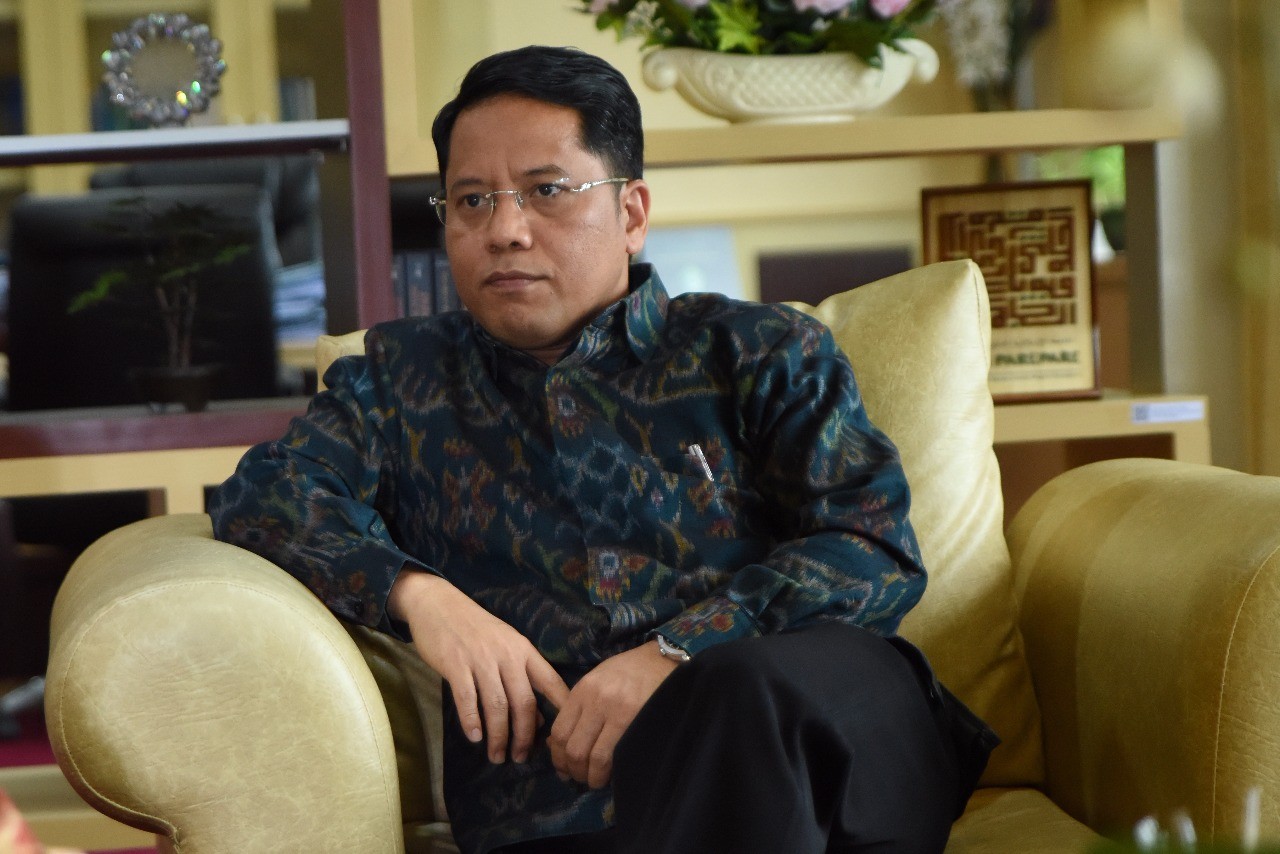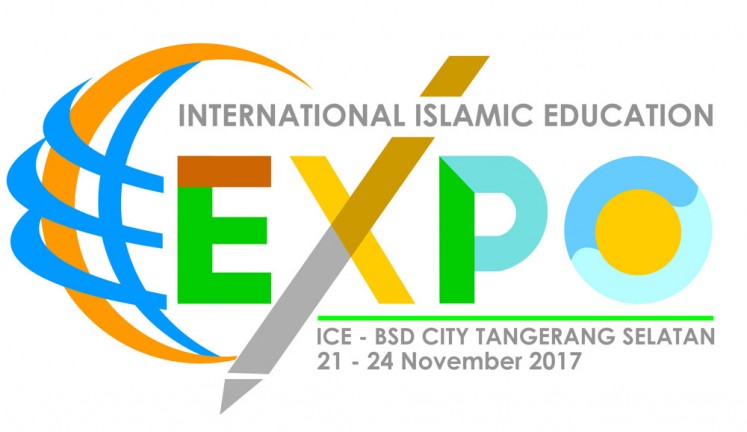Popular Reads
Top Results
Can't find what you're looking for?
View all search resultsPopular Reads
Top Results
Can't find what you're looking for?
View all search resultsExhibition aimed at promoting peaceful Islam
Change text size
Gift Premium Articles
to Anyone
T
he International Islamic Education Exhibition will be held at the Indonesia Convention Exhibition (ICE), BSD, South Tangerang, Banten, from Nov. 21 to Nov. 24.
Islam is the majority religion in Indonesia and the country is for the most part socially and politically stable and peaceful, largely as a result of the significant role that Islamic educational institutions play in spreading and disseminating the universal values of peace and tolerance, according to Dr. Kamarudin Amin, director general of Islamic Studies at the Religious Affairs Ministry.
Kamarudin said that Islam in Indonesia had its own typical characteristics, different from those in several other countries, because it developed in a country with highly diverse local cultures, traditions, ethnic groups and religions.
“It is no wonder that Islamic studies, particularly at Islamic higher education institutions/universities, produce scholars, known locally as ulama with a sense of tolerance, who appreciate differences and changes, unlike their peers in Saudi Arabia, for example, whose Islamic higher education institutions produce conservative scholars,” he said.
Thanks to the contributing role of Islamic educational institutions, most Muslims in Indonesia embrace civil and humanitarian Islam and are moderate, inclusive peace lovers and have a sense of tolerance, as well as being ready to change and advance. “We [Indonesian Muslims] also respect the value of gender equity, among the issues which Western people pay attention to,” he said.
Kamarudin made the remarks ahead of the International Islamic Education Exhibition being organized by the Religious Affairs Ministry. The exhibition will be held from Nov. 21 to Nov. 24 at the Indonesia Convention Exhibition (ICE), one of the most renowned and fully equipped MICE facilities in Indonesia.
The exhibition will see 200 participants, comprising educational institutions and partners from home and abroad.
The exhibition will feature several events including the Annual International Conference on Islamic Studies or AICIS, the Jakarta Declaration, Islamic Studies Appreciation (API), the International Conference on Islamic Boarding Schools (pesantren) System and Student Performing Arts, according to the ministry’s website’s pedis.kemenag.gto.id.
The exhibition aims to showcase Islamic education and studies in the country to a broader audience in Indonesia and overseas.
It also aims to promote Islamic studies in Indonesia among domestic and international communities about the potential that Indonesia has to become an Islamic study destination.
From the exhibition, visitors will get ample information on Islamic studies and education in Indonesia from way back in the past until the present.
Kamarudin said that the exhibition was also expected to counter a view that Indonesia embraces Islamic values that are incompatible with change, modernity, advancement or democracy
He also disclosed the growing interest among overseas students in Islamic studies in Indonesia.
“Currently, about 400 students from 29 countries study Islam in Malang Islamic State University.”
“Then in Jakarta, we have students from 10 countries; in Riau, Pekanbaru, and in Yogyakarta there are also many. Almost all of our Islamic universities have overseas students. IAIN also has overseas students, many of whom are from Thailand. So, there is a very big interest,” he said, adding that such activities had to be continually encouraged.
However, he said, today’s globalized era in which communication is wide open enabling people to have access to Islamic education from anywhere was a challenge because “this potentially leads to the emergence of radical and hardliner groups.”
“We’ve faced this challenge by holding a dialog with them, exchanging views and sharing the teaching of true and peaceful Islamic values that best fit Indonesia,” he said.
He expressed the hope that the exhibition would open the widow to the world that Indonesia can be an alternative destination for Islamic studies and an Islamic civilization center.
He noted that it was of importance to safeguard Islam in Indonesia, an Islam that promoted peace and tolerance. “If we work together, I am optimistic Indonesia will be one of the strongest countries in the world and become a center for Islamic civilization.”
Meanwhile, the ministry said on its website that Indonesia was home to the biggest population of Muslims in the world. With Muslims numbering no fewer than 200 million people (87.2 percent of the total population), Islam is the dominant religion of the country.
Moreover, Indonesia is known for its diverse local cultures, and is home to a large number of ethnic groups and several religions. Nevertheless, the people can live harmoniously and in peace.
Being the biggest archipelago in the world is another potential benefit for Indonesia; the geography contributes significantly to the diversity of communities and cultures the country enjoys, including the variety of Islamic studies and education based on the forms or learning practices.
Compared to other Muslim-majority countries, Indonesia has more Islamic educational institutions under the supervision of the Religious Affairs Ministry, starting from madrasa (around 75,000 institutions), pesantren (28,000), to Islamic higher education institutions (600).
Most of these institutions are founded by private foundations and religious organizations, such as Al-Khairat, Al-Washliyah, Nahdlatul Wathan, Mathlaul Anwar, Muhammadiyah, Nahdlatul Ulama, Al-Irsyad, and Persatuan Islam (PERSIS).
Aside from managing educational institutions, these organizations work in public services, like health and financial services.
In fact, one can easily find many schools, higher-education institutions, and hospitals across the country that are managed by these organizations, especially by two of the biggest religious organizations: Muhammadiyah and Nahdlatul Ulama.
These organizations play a pivotal role in the religious movement in the country, in general, and in education, especially.
To note, Islamic education in the country has given birth to many Muslim scholars, each having written various monumental books. Some of them are Syekh Nawawi al Bantany (1813-1897), Syekh Yusuf al-Makassary (1626-1699), Syekh Nuruddin ar-Raniry (1658), Syekh Abdus Samad al-Falimbany (1704-1785), and many more. Their works are acknowledged in the Islamic world and are studied even today.
The treasure trove of Islamic cultures and traditions coming out of Indonesia has for long made the country a kind of laboratory for researchers from different countries. Thomas Stamford Raffles (1781-1826) with his book, History of Java; Clifford Geertz (1926-2006) with his anthropological theory posited in Religion of Java; and Benedict Anderson (1936-2015) with his political theory presented in Imagined Communities: Reflections on the Origin and Spread of Nationalism, to name a few, were foreign researchers who developed their major works from their research in the archipelago.
Based on these potentials, Indonesia deserves the recognition as one of the cradles of civilization. Islam in Indonesia, along with various resources, including the people (intellectuals), academia (scientific works), and institutions (mass organizations, schools, higher education institutions), is such that “we can share with people and benefit the world,” according to the website.











